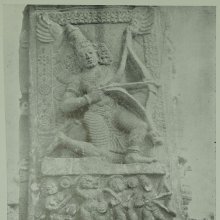Tarakaksha, Tārakākṣa: 9 definitions
Introduction:
Tarakaksha means something in Hinduism, Sanskrit. If you want to know the exact meaning, history, etymology or English translation of this term then check out the descriptions on this page. Add your comment or reference to a book if you want to contribute to this summary article.
The Sanskrit term Tārakākṣa can be transliterated into English as Tarakaksa or Tarakaksha, using the IAST transliteration scheme (?).
Images (photo gallery)
In Hinduism
Purana and Itihasa (epic history)
Source: archive.org: Shiva Purana - English TranslationTārakākṣa (तारकाक्ष) refers to one of the three sons of Tāraka-Asura, according to the Śivapurāṇa 2.5.1 (“Description of Tripura—the three cities”).—Accordingly, as Sanatkumāra narrated to Vyāsa: “O great sage, when the Asura Tāraka was killed by Skanda, the son of Śiva, his three sons performed austerities. The eldest of them was Tārakākṣa, the middle one Vidyunmālī and the youngest Kamalākṣa. All of them were of equal strength. They were self-controlled, well prepared, disciplined, truthful, of steady mind, heroic and inimical to the gods. [...]”.
Source: JatLand: List of Mahabharata people and placesTārakākśa (तारकाक्श) is a name mentioned in the Mahābhārata (cf. IX.44.80) and represents one of the many proper names used for people and places. Note: The Mahābhārata (mentioning Tārakākśa) is a Sanskrit epic poem consisting of 100,000 ślokas (metrical verses) and is over 2000 years old.
Source: Shodhganga: The saurapurana - a critical studyTārakākṣa (तारकाक्ष) refers to one of the three sons of the demon Tāraka, according to the 10th century Saurapurāṇa: one of the various Upapurāṇas depicting Śaivism.—Accordingly, the Saurapurāṇa in two chapters 34 and 35 relates the Tripuradhana myth thus:—“[...] The demon Tāraka who was killed by Kārttikeya had three sons namely Vidyunmāli, Tārakākṣa and Kamalāksa. These powerful demons propitiated Brahmā with their formidable penance. They received the boon that they would not be killed by the Devas and the Asuras. [...] Then the demons consulting each other prayed Brahmā to grant the boon of establishing three cities and live there roaming in the three worlds. [...] Then Maya, the architect, created three cities, the iron one in the earth for Vidyunmāli, the silver one in the midair for Tārakākṣa and the other of gold in the heaven for Kamalāksa”.

The Purana (पुराण, purāṇas) refers to Sanskrit literature preserving ancient India’s vast cultural history, including historical legends, religious ceremonies, various arts and sciences. The eighteen mahapuranas total over 400,000 shlokas (metrical couplets) and date to at least several centuries BCE.
Languages of India and abroad
Sanskrit dictionary
Source: Cologne Digital Sanskrit Dictionaries: Edgerton Buddhist Hybrid Sanskrit DictionaryTārakākṣa (तारकाक्ष).—(compare Tārākṣa), name of a mountain: Divyāvadāna 102.29 (Nīlodas Tār° ca parvatau).
Source: Cologne Digital Sanskrit Dictionaries: Benfey Sanskrit-English DictionaryTārakākṣa (तारकाक्ष).—1. adj. having stars for eyes. 2. m. a proper name. Tryakṣa, i. e.
Tārakākṣa is a Sanskrit compound consisting of the terms tāraka and akṣa (अक्ष).
Source: Cologne Digital Sanskrit Dictionaries: Cappeller Sanskrit-English DictionaryTārakākṣa (तारकाक्ष).—[adjective] star-eyed.
Source: Cologne Digital Sanskrit Dictionaries: Monier-Williams Sanskrit-English Dictionary1) Tārakākṣa (तारकाक्ष):—[from tārakā > tāra] mfn. (kāk) ‘star-eyed’ [Mahābhārata ix, 2586]
2) [=tārakā-kṣa] [from tārakākṣa > tārakā > tāra] m. Name of a Daitya (son of Tāraka), [Mahābhārata vii f.; Matsya-purāṇa cxxviii; cxxxvii]
3) [v.s. ...] See rākṣa.
[Sanskrit to German]
Sanskrit, also spelled संस्कृतम् (saṃskṛtam), is an ancient language of India commonly seen as the grandmother of the Indo-European language family (even English!). Closely allied with Prakrit and Pali, Sanskrit is more exhaustive in both grammar and terms and has the most extensive collection of literature in the world, greatly surpassing its sister-languages Greek and Latin.
See also (Relevant definitions)
Partial matches: Aksha, Ksha, Taraka.
Full-text (+24): Taraksha, Tarakakhya, Kamalaksha, Vidyunmalin, Hemapura, Triputra, Putratraya, Tripura, Tulyabala, Devadrohin, Satyavadin, Tarakasuta, Jitendriya, Kaniyas, Pujayat, Shambhutejas, Tripuravahni, Nirdagdha, Samhrishta, Mohamurcchita.
Relevant text
Search found 9 books and stories containing Tarakaksha, Tārakākṣa, Tārakākśa, Tarakaksa, Taraka-aksha, Tāraka-akṣa, Taraka-aksa, Taraka-ksha, Tārakā-kṣa, Taraka-ksa; (plurals include: Tarakakshas, Tārakākṣas, Tārakākśas, Tarakaksas, akshas, akṣas, aksas, kshas, kṣas, ksas). You can also click to the full overview containing English textual excerpts. Below are direct links for the most relevant articles:
List of Mahabharata people and places (by Laxman Burdak)
Mahabharata (English) (by Kisari Mohan Ganguli)
Rudra-Shiva concept (Study) (by Maumita Bhattacharjee)
8. Destruction of the three cities < [Chapter 5 - Rudra-Śiva in the Purāṇic Literature]
4. Forms of Śiva and his different activities < [Chapter 5 - Rudra-Śiva in the Purāṇic Literature]
Puranic encyclopaedia (by Vettam Mani)
The Shiva Purana (by J. L. Shastri)
Chapter 1 - Description of Tripura (the three cities) < [Section 2.5 - Rudra-saṃhitā (5): Yuddha-khaṇḍa]
Chapter 10 - The burning of the Tripuras < [Section 2.5 - Rudra-saṃhitā (5): Yuddha-khaṇḍa]
The backdrop of the Srikanthacarita and the Mankhakosa (by Dhrubajit Sarma)
Part 4 - Theme of the poem [Śrīkaṇṭhacarita] < [Chapter II - The Śrīkaṇṭhacarita]
Part 6 - Innovations and deviations < [Chapter II - The Śrīkaṇṭhacarita]
